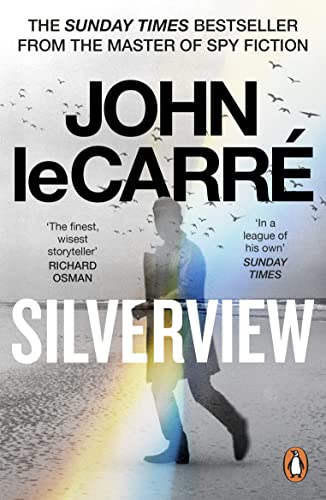Customer Services
Copyright © 2025 Desertcart Holdings Limited
Desert Online General Trading LLC
Dubai, United Arab Emirates



Silverview: The Sunday Times Bestseller
T**R
The last (and, sadly, somewhat disappointing) completed novel of a master craftsman.
Rating: 2.4/5Not far short of a year has elapsed since John Le Carré passed away in December 2020. "Silverview" is billed as the last novel that he completed during his lifetime and its publication has been eagerly anticipated by many people who admired the work of the master craftsman that Le Carré so often showed himself to be. Sadly, this is unlikely to go down as one of his best or most memorable novels, and is actually somewhat disappointing.There are glimpses of Le Carré at his best with some tantalising wordsmithery and eloquent prose. "Silverview" also contains a number of wonderfully drawn characters with genuine depth and appeal. However, in spite of those elements and despite the fact that this is described as his final completed novel something feels amiss. It isn't simply that the book is unusually short, but there is also the sense that certain sections still feel as though they are "work in progress". The bones of the structure are there, but there is the impression that Le Carré still intended to revisit certain passages and flesh them out more fully.We will probably never know for sure whether that was actually the case, so perhaps John Le Carré has left his readers with one final mystery and conspiracy theory to ponder over, after all.
M**S
The best lack all conviction, while the worst are full of passionate intensity
Silverview is John Le Carré’s posthumously published 2021 novel about a City trader who plots an escape to bookshop ownership in a quiet English seaside town. But once installed in his new shop, he inadvertently becomes involved in the affairs of a disenchanted former spy.Obviously, reviewing a book like this involves not giving away plot details, keeping secrets, as any good agent gathering information is obliged to do. But a review is also designed to let people in on a few secrets so that a potential reader can decide if this is a book for them. Or you might have already read the book and are looking to see what someone else found in it. Tricky - the secrets you keep or give away in this intelligence report.What I will say is that I enjoyed Silverview. To me it was a study in the contradictions of belief, the meaning that people find in being passionate about something - whether that’s related to religion, politics, nationality or fighting the good fight against extreme manifestations of whatever belief people latch onto. Agents who are passionate about the rightness of their mission are highly motivated. However, that passion remains an unpredictable energy, which can easily express itself in dangerous ways. Here we have the thoughts of a Secret Service staffer, who characterises life in the Service as the avoidance of passion:“Absolute commitment of any sort constituted to his trained mind a grave security threat. The entire ethic of the Service was utterly – he would almost say absolutely – opposed to it, unless, that is, you were talking of manipulating the absolute commitment of an agent you were running.”As a final note, with an admitted risk to security, I will share one thought with you, which might help provide a way into the central contradiction of Silverview. Perhaps Le Carré puts his main idea into the form of a little code. It would be a similar code to that found in the name of the lovely character, Liz Gold, in The Spy Who Came In From The Cold. In that book it is hard to work out where exactly constitutes the Cold, when one side uses the same ruthless tactics as the other. This confusion might be characterised by Liz Gold’s name - gold sounding so close to cold. Silverview has a character who reminded me of Liz.. She has a “nun like” devotion, representing a capacity for passionate commitment, which has ambivalent outcomes. Her name is only one letter away from ‘mania’. I will leave you to find her and come to your own conclusions.This book brings the spy story into an age where those national struggles the Service was built to support, have themselves become a threat. It’s a fascinating and timely addition to Le Carré’s collection of work.
S**I
Poor
Have to say this is a poorly plotted story populated with a combination of thinly drawn characters (Julian and Lily) and the implausible and ridiculous Edward who is supposed to be some sort of super spy but has the most absurd line in dialogue and even more silly tradecraft. There's a kernel of a story about an incoherent British foreign policy, declining empire and illegal wars but it amounts to little more than a few observations. Better off re-reading some of his classic novels than waste time on this.
P**N
As always, a human look at the world of intelligence agencies
John Le Carré’s last novel, does not disappoint. It gives the same, practical insight into the British intelligence world his readers will be familiar with from his earlier books. He shows the life of an organisation, not only doing the job it was created to do, but also concerned about how things look and who is going to be the fall-guy if anything goes wrong, and worried about its position vis-à-vis inter-agency rivalry and blame culture.There is also an appropriateness about the subject matter of the story given the stage in John Le Carré’s writing career it was written. His novels have always reflected the geo-political environment of their time, and his characters have been shown practising their craft, mostly in mid-career. In “A Legacy of Spies” we saw a retrospective of past exploits from the viewpoint of retired service officers. In “Silverview” we are shown what happens in the life of a former agent once retired. “Silvervew” gives us a glimpse at the reality of the-happy-ever-after for an agent once they are no longer of use to the agency.As always, Le Carré brings human motivation to the surface, and demonstrates the wilful blindness of organisations that can sometimes let errors of judgement slip through to cause cracks in what appears to be a totally watertight operation. He describes a situation where an organisation’s failure to care for its members’ wellbeing, and to take cognizance of an agent’s mental state, can lead to aberrant behaviour, a trait common to many organisations in every sector.Never one to shy away from highlighting his views on the political leadership of the countries concerned, he describes the internal questioning of an intelligence agency that is serving a country ruled by a government with no coherent foreign policy, a government that is focused on its own internal political power rather than its relationship with the rest of the world.This is an excellent read.
Trustpilot
2 months ago
1 month ago